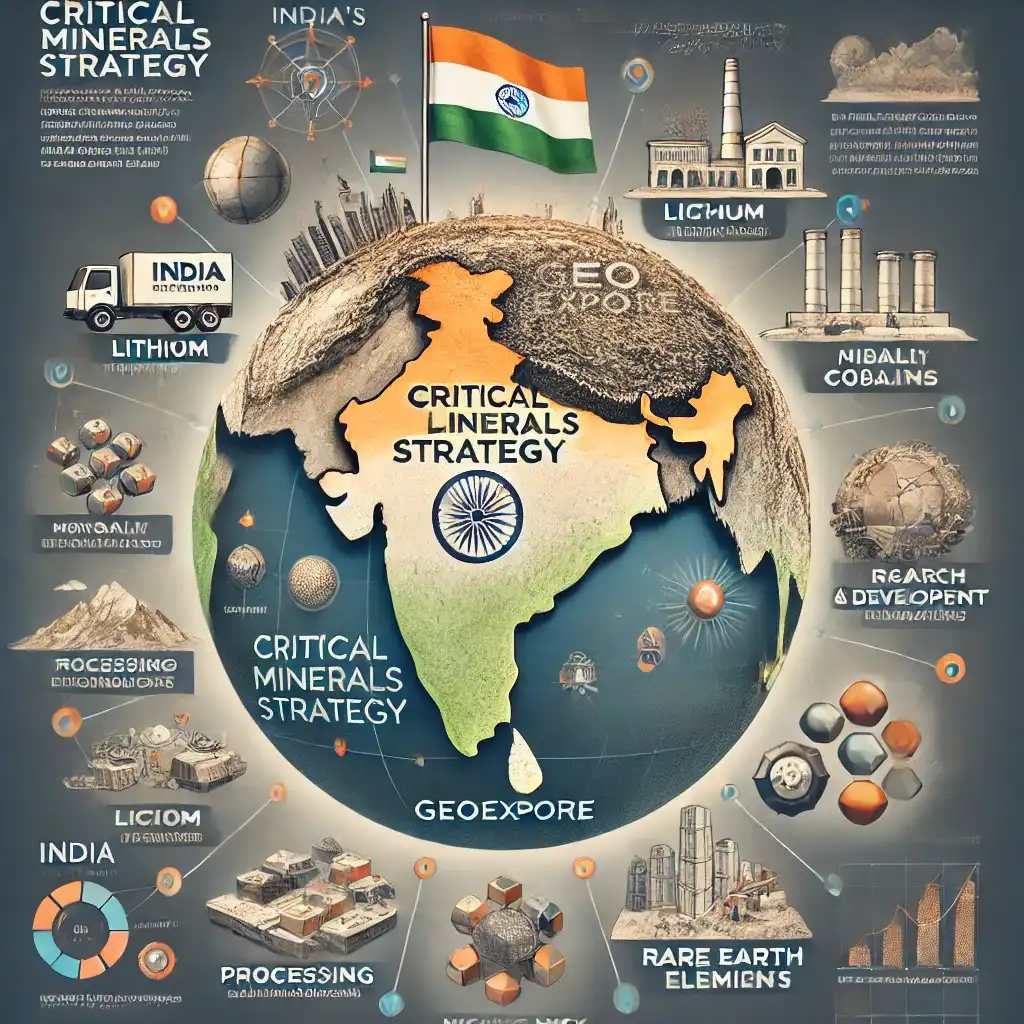By Channamallikarjun B. Patil
Introduction
Critical minerals, such as lithium, cobalt, nickel, and rare earth elements, are essential components in technologies like electric vehicles (EVs), renewable energy systems, and advanced electronics. As global demand surges, securing a stable supply of these minerals has become a strategic priority for nations worldwide. India, aiming to position itself as a leader in clean energy and technological innovation, is actively developing strategies to achieve self-reliance in critical minerals.
The Evolving Global Supply Chain of Critical Minerals
The global supply chain for critical minerals is undergoing significant transformations due to geopolitical shifts, technological advancements, and increasing demand. Key developments include:
- Diversification of Supply Sources: Countries are seeking to reduce dependence on single suppliers by exploring and developing mineral resources in various regions.
- Strategic Partnerships: International collaborations, such as the Mineral Security Partnership (MSP), aim to secure reliable supplies of critical minerals through shared investments and technological cooperation.
- Technological Innovations: Advancements in extraction and processing technologies are enhancing the efficiency and environmental sustainability of critical mineral production.
India’s Initiatives in Building Its Critical Minerals Strategy
Recognizing the importance of critical minerals for its economic and strategic objectives, India has launched several initiatives:
1. Formation of KABIL
Khanij Bidesh India Ltd (KABIL), a joint venture between three public sector undertakings, has been tasked with acquiring critical mineral assets globally. India is actively seeking mineral exploration agreements with resource-rich nations, including Australia, Argentina, and Chile, to ensure steady supplies of lithium and other key elements.
2. Critical Minerals Mission
Announced in the 2024 Budget, this mission aims to ensure the availability of essential minerals for emerging technologies, reflecting the government’s commitment to fostering innovation and economic growth. The mission focuses on accelerating exploration, securing supply chains, and boosting domestic production capabilities to make India a key player in the global critical minerals market.
3. Policy Reforms and Incentives
The government plans to introduce financial incentives aimed at developing critical minerals like lithium. This includes funding research institutes to provide technical assistance to miners, thereby reducing reliance on imports.
4. Domestic Exploration & Processing Capacity Development
While India has deposits of key minerals, including lithium in Karnataka, its processing capabilities remain limited. The government is actively investing in domestic refining and processing infrastructure to reduce reliance on imports.
5. International Collaborations & Trade Agreements
India has signed strategic agreements with the U.S., Australia, and other nations to develop a secure supply chain for critical minerals. Additionally, India is seeking access to offshore mineral resources, particularly in Africa and Latin America.
Pathways to Achieving Self-Reliance
To attain true self-reliance in critical minerals, India must focus on:
- Enhancing Domestic Exploration and Production: Investing in advanced geological surveys and facilitating private sector participation to identify and develop domestic mineral reserves.
- Developing Processing and Refining Capabilities: Establishing state-of-the-art processing facilities to add value to raw minerals domestically, reducing dependency on foreign processing services.
- Fostering Research and Development: Encouraging innovation in extraction and processing technologies through collaborations between industry and research institutions.
- Ensuring Environmental Sustainability: Implementing eco-friendly mining practices to minimize environmental impact and promote sustainable development.
GeoExpOre’s Contribution to India’s Critical Minerals Sector
GeoExpOre is playing a pivotal role in advancing India’s self-reliance in critical minerals through:
- Exploration Initiatives: Conducting extensive geological surveys to identify potential mineral deposits within India, thereby reducing the need for imports.
- Development of Processing Technologies: Collaborating with leading research institutions to innovate processing and extraction technologies tailored to India’s unique mineralogical landscape.
- Establishment of Processing Hubs: Proposing the creation of regional mineral processing hubs near key mining sites to enhance efficiency and reduce transportation costs.
- Building Strategic Partnerships: Engaging in collaborations with international mineral processing companies to bring advanced technologies to India, ensuring that domestic processing meets global standards.
- Commitment to Sustainability: Investing in environmentally friendly processing methods that reduce energy consumption and minimize waste, aligning with global sustainability goals.
Conclusion
As the global landscape for critical minerals continues to evolve, India’s proactive strategies and the contributions of industry leaders like GeoExpOre are crucial for achieving self-reliance. Through comprehensive policy reforms, international collaborations, technological innovations, and sustainable practices, India is poised to secure its position in the global critical minerals supply chain, ensuring economic growth and technological advancement.
Note: The information presented in this blog is based on current developments and may evolve as new data becomes available.

